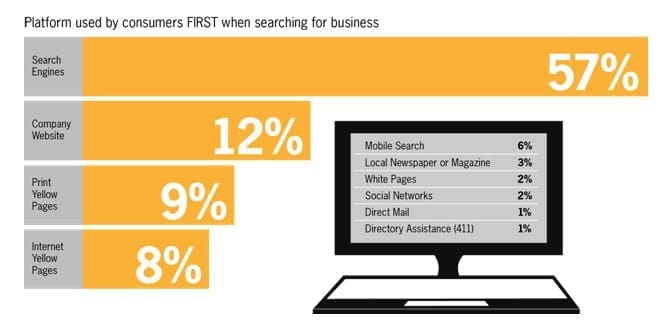
 Yellow-pages-year-over-year-growth-...
Yellow-pages-year-over-year-growth-... Back in April I wrote a blog post that encouraged all of the Yellow Pages obituary writers out there to put down their pens and re-examine the facts. Sure enough, more evidence emerged last month that the medium is still a major destination for ready-to-buy shoppers. A recent study released by CRM Associates showed that calls to the Print Yellow Pages were up for the third year in a row. The study focused specifically on ads that remained the same from year to year—maintaining an identical ad size in the same heading for both 2010 and 2011, tracked by a unique phone number.
The study reports that across the 26,929 advertisers who had these year-over-year ad setups, two-thirds (66%) saw increases in their call volumes from 2010 to 2011. Studies spanned 1,734 directories with widely varying distribution sizes, and included 1,033 headings. Among advertisers who saw a rise, the average increase in calls was 45%. The overall number of calls to the ads in the study increased 17% from the previous year, showing that despite the widely reported imminent death of Yellow Pages, the medium is still going strong. Calls to display ads increased by 16%, and in-column ads (listed alphabetically within the heading) rose 31%.
Gains were greater in small-to-medium markets. Directories with distributions below 100,000 saw over 20% increases in calls to display ads, with over 70% of advertisers experiencing an improvement. These findings are consistent with the perception that print Yellow Pages usage remains higher in more rural areas. Even so, half of the advertisers in the largest markets saw increases, and overall calls to display ads in those areas were up 11%. Small to medium display ads saw the highest gains, but regardless of the size of the display ad, no fewer than 63% of advertisers saw an increase. Results varied by heading, of course, but of the top 140 headings, 92% saw an increase in calls from 2010 to 2011.
The study also looked at Internet Yellow Pages. While results were still stronger on the print side, Internet Yellow Pages ads saw an 11% increase in calls, and just over half of advertisers experienced increases from the previous year. So, at this point you’re probably asking why this is the case, even though overall references to the Yellow Pages have been on the decline. As I mentioned in my previous post on this subject, part of it could be that some advertisers have been weeded out, leaving the remaining advertisers to field their share of the calls.
However, CRM Associates’ President and industry research expert Dennis Fromholzer notes that the advertisers that are leaving are probably the ones who didn’t experience much success with their ads in the first place, so the number of callers that would have called those ads is small. As a result, he theorizes that the bulk of the increase is actual growth attributable to the recovery of the economy. In looking at the same study across prior years, you can see that calls per ad dropped considerably when the recession began, and steadily recovered to just about even in 2008. Since then, the calls per ad have increased each year, to a high of 17% growth in 2011. As the economy continues to recover and jobs are recouped, it stands to reason that consumers will start spending again.

In my previous post I highlighted the fact that some of the strongest headings are in the home improvement realm. Certainly one of the first things to go when unemployment hits are large-ticket home improvements. I wouldn’t be surprised to see headings like that grow as people regain employment and finally have the financial means to tackle projects on their “to do” list that were put off during periods of decreased income. The key to this study is that the phone numbers in the ads were unique, tracked numbers. These numbers are placed only in these ads, so we know exactly how many calls came into the advertiser directly from the Yellow Pages.
At DAC, we encourage all of our clients to test as much as possible, because it’s the only true way to know which media are the most successful for them. We often hear from advertisers that the Yellow Pages aren’t working, but when we ask for the results of any call tracking they’ve done, the truth comes out—they haven’t done any. We highly recommend testing across all media to find out what is or isn’t working, and to gain insight into how to improve the program further. The publishers are happy to work with us to offer free or reduced cost test lines to prove the value of their product, and DAC’s research department provides thorough reporting to give you a clear idea of what your ads are bringing in. And if Yellow Pages aren’t working for your category, we’re happy to find you something else that will. But you just don’t know until you test!
In the meantime, this study proves that the Yellow Pages are still a viable medium that’s not only surviving, but capable of growth. It’s also a good reminder that call tracking is a valuable tool in determining the success of any media campaign. If you’re not utilizing call tracking, you’re missing out on the full story!
Interested in finding out more? Contact us today!

